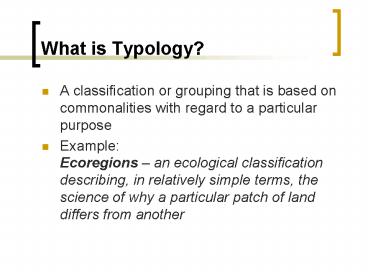What is Typology - PowerPoint PPT Presentation
1 / 9
Title:
What is Typology
Description:
Suitability for particular uses. Sensitivity to particular phenomenon ... Think criteria and priorities; suitability modeling; SWOT (strengths, weaknesses, ... – PowerPoint PPT presentation
Number of Views:683
Avg rating:3.0/5.0
Title: What is Typology
1
What is Typology?
- A classification or grouping that is based on
commonalities with regard to a particular purpose - Example Ecoregions an ecological
classification describing, in relatively simple
terms, the science of why a particular patch of
land differs from another
2
Landscape Typology at the Watershed Scale
- Categorizing the landscape into relevant types
reveals the landscape role (function) in natural
processes and human settlements - Suitability for particular uses
- Sensitivity to particular phenomenon
- Yields appropriate use and design guidelines (at
a coarse scale)
3
Take a small but varied company to any
convenient viewing place overlooking some portion
of the city and countryside and have each, in
turn, describe the landscape We may certainly
agree that we will see many of the same elements
houses, roads, trees, hillsbut such facts take
on meaning only through association they must
be fitted together according to some coherent
body of ideas. Thus we confront the central
problem any landscape is composed not only of
what lies before our eyes but what lies within
our heads.
Meinig, D.W. 1979. The Beholding Eye Ten
Versions of the Same Scene. in The
Interpretation of Ordinary Landscapes. D.W.
Meinig (ed). New York Oxford Press. pp. 33-34.
4
Your Task
- Propose a typology (grouping) for the Los
Angeles Watershed / L.A. River - Should interpret the landscape from a particular
perspective - Synthesize at lease 3 factors into a composite
assessment model that describes the landscape - Could be based on
- One Analysis Perspective
- Landscape as Ecoregions
- Combined Analyses Perspective
- Landscape as Historical Hydrology
- A Derived Typology
- Landscape as Wal-Mart Site
5
Flow Chart for Your Model
- A recipe for how to execute your model in GIS
- List all data needed (ingredients)
- Proposes how they will be combined to yield
desired output (map) - Includes Rules of Combination
- Think criteria and priorities suitability
modeling SWOT (strengths, weaknesses,
opportunities and threats)
6
Landscape as Wal-Mart Site Sample Flow Chart
Land Use The more vacant the better
Slope The flatter the better
Major Roads 1 km buffer around Freeways and
Principal Arterials
Union
Possible Sites Map
Accessibility Map
Union
Wal-Mart Potential Map
7
Rules of Combination for unioning slope and
Land Use Layers
8
Rules of Combination for unioning possible
Sites and Accessibility Layers
9
Your Poster Should
- Include a Descriptive Title
- Provide an Overview of the Project
- Describe and illustrate your model
- Flow Chart
- Rules of Combination
- In-process maps
- Provide background on your factors, as
appropriate - Diagrams, maps, illustrations, etc. (perhaps from
analysis) - Discuss Implications of your model
- Potential design and planning policies or
guidelines which may emerge as a result of your
work. - Work in PowerPoint or other program of your
choosing - Work must be saved as either a PPT or PDF or JPG
file - Poster should not exceed 30 x 40 in size.































